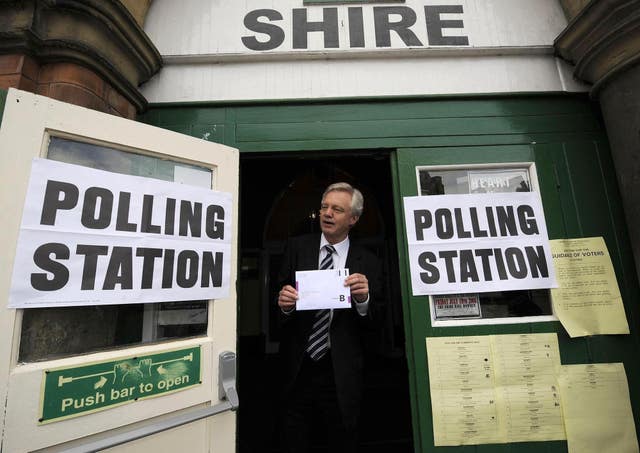
David Davis has quit his role as Brexit Secretary less than two years after his appointment.
His resignation is a major blow to Prime Minister Theresa May and comes after he signed up to the Brexit plan agreed by the Cabinet at Chequers on Friday.
He was understood to have serious reservations about both the plan and whether it could be acceptable to Brussels.
– Here is a look at the career of the long-standing Eurosceptic, 69, who readily admitted to having been branded a “charming bastard”.
Mr Davis was elected for Haltemprice and Howden in 1997, having originally sat for Boothferry since 1987.
 David Davis arrives to cast his vote in the Haltemprice and Howden by-election (John Giles/PA)
David Davis arrives to cast his vote in the Haltemprice and Howden by-election (John Giles/PA)
He read molecular science at Warwick University and studied management at Harvard after shining at grammar school.
The married father-of-three first honed his negotiating skills in the cut-throat world of big business.
He enjoyed corporate success in his thirties as a director of Tate and Lyle and President of Zymaize, a loss-making Canadian sweetener manufacturer which he turned into a gold mine.
Mr Davis became politically active as a student, cutting an imposing figure even then as chairman of the Federation of Conservative Students.
A man with brawn as well as brains, he served as an SAS reservist to help fund himself through college, before entering Parliament in 1987.
He had a tough upbringing by a single mother in a Labour working-class household in south London, and still bears the scar on his upper lip from a crowbar attack in Brixton.
The two-time unsuccessful Conservative leadership contender gained a fearsome reputation after taking a series of ministerial scalps in a previous role of shadow home secretary.
Among those he claims as his victims are former home secretaries David Blunkett and Charles Clarke and ex-home office minister Beverley Hughes.
 He claimed David Blunkett among his scalps (Dave Thompson/PA)
He claimed David Blunkett among his scalps (Dave Thompson/PA)
In June 2008, as shadow home secretary, he shocked Westminster by announcing that he was resigning as an MP to “take a stand” against the terror detention plan, sparking a by-election that saw him hold his Haltemprice and Howden seat.
He was regarded by many as the likely next Tory leader after Michael Howard announced he was to resign, but after a weak campaign – in his second tilt at the leadership – he was soundly beaten in 2005.
His rival, David Cameron, had caught the mood with his careful presentation and youthful optimism.
In the 2001 leadership contest, Mr Davis cut his losses and quit after twice finishing way down the pack in early ballots of Tory MPs, throwing his support behind Iain Duncan Smith.
The contest successfully raised his profile and Mr Duncan Smith appointed him party chairman.
A libertarian who was never afraid to speak his mind, even if his opinions fell outside the party line, he worked closely with former Liberty director Shami Chakrabarti.
 He counted Alastair Campbell among his friends (Danny LAwson/PA)
He counted Alastair Campbell among his friends (Danny LAwson/PA)
His friendship with former Downing Street spin chief Alastair Campbell raised Conservative eyebrows.
Mr Davis once revealed that he offered to buy Mr Campbell’s old newspaper the Daily Mirror so the former journalist could edit it.
He put their unlikely friendship down to his liking for ”strong mavericks” and there is something of that description in him.
Despite Eurosceptic views, he acted as a whip for John Major during the bruising battle to ratify the Maastricht Treaty.
Mr Davis has previously listed mountaineering, parachuting and flying light aircraft among his more athletic pursuits.



Why are you making commenting on The Herald only available to subscribers?
It should have been a safe space for informed debate, somewhere for readers to discuss issues around the biggest stories of the day, but all too often the below the line comments on most websites have become bogged down by off-topic discussions and abuse.
heraldscotland.com is tackling this problem by allowing only subscribers to comment.
We are doing this to improve the experience for our loyal readers and we believe it will reduce the ability of trolls and troublemakers, who occasionally find their way onto our site, to abuse our journalists and readers. We also hope it will help the comments section fulfil its promise as a part of Scotland's conversation with itself.
We are lucky at The Herald. We are read by an informed, educated readership who can add their knowledge and insights to our stories.
That is invaluable.
We are making the subscriber-only change to support our valued readers, who tell us they don't want the site cluttered up with irrelevant comments, untruths and abuse.
In the past, the journalist’s job was to collect and distribute information to the audience. Technology means that readers can shape a discussion. We look forward to hearing from you on heraldscotland.com
Comments & Moderation
Readers’ comments: You are personally liable for the content of any comments you upload to this website, so please act responsibly. We do not pre-moderate or monitor readers’ comments appearing on our websites, but we do post-moderate in response to complaints we receive or otherwise when a potential problem comes to our attention. You can make a complaint by using the ‘report this post’ link . We may then apply our discretion under the user terms to amend or delete comments.
Post moderation is undertaken full-time 9am-6pm on weekdays, and on a part-time basis outwith those hours.
Read the rules hereLast Updated:
Report this comment Cancel